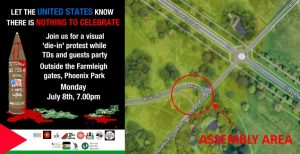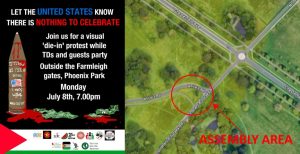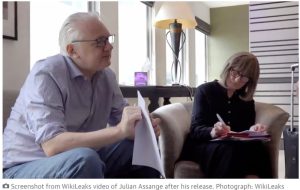This is no ripping yarn, but a murder to fan more conflict
The media may revel in a Mossad hit, yet Britain’s response to a plot that could threaten its own citizens has been craven
Seumas Milne
The Guardian, Thursday 18 February 2010
This is no ripping yarn, but a murder to fan more conflict
The media may revel in a Mossad hit, yet Britain’s response to a plot that could threaten its own citizens has been craven
Seumas Milne
The Guardian, Thursday 18 February 2010
Imagine for a moment what the reaction would be if Iranian intelligence was almost unversally believed to have assassinated a leader of one of the organisations fighting the Tehran government in a western-friendly state. Then consider how Britain, let alone the US, might respond if the killers had carried out the operation using forged or stolen passports of citizens of four European states, including Britain, with dual Iranian nationality.
You can be sure it would have triggered a major international storm, stentorian declarations about the threat of state-sponsored terrorism, and perhaps a debate at the UN security council, with demands for harsher sanctions against an increasingly dangerous Islamic republic.
Substitute Israel for Iran, and the first part of that scenario is exactly what happened in Dubai last month. A senior Hamas official, Mahmoud al-Mabhouh, was murdered in his hotel room in what was widely assumed from the start to be an operation by the Israeli intelligence service Mossad. Less than a month later, strong suspicion has turned to as good as certainty with the revelation that the hit team had used the passport identities of six Britons with dual nationality and currently living in Israel.
But instead of setting off a diplomatic backlash, the British government sat on its hands for almost a week after it was reportedly first passed details of the passport abuse. And while the Foreign Office finally summoned the Israeli ambassador to "share information", rather than protest, Gordon Brown could yesterday only promise a "full investigation".
In parallel with this languid official response, most of the British media has treated the assassination more as a ripping spy yarn than a bloody scandal which has put British citizens at greater risk by association with Mossad death squads. It was an "audacious hit", the Daily Mail enthused, straight out of a "Frederick Forsyth page-turner", while the Times revelled in an attack that resembled nothing so much as a "well-plotted murder mystery".
Running throughout all this is a breathless awe at Mossad’s reputation for ruthless brilliance in seeking out and destroying Israel’s enemies. In reality, the Dubai operation was badly bungled, as the Israeli press has already started to acknowledge. Despite having the relatively easy target of an unarmed man in a luxury hotel in a non-hostile Gulf state, Mossad managed to get its agents repeatedly caught on CCTV and effectively exposed Israel’s responsibility through the hamfisted passport scam.
Dubai follows a long history of Mossad bungles, from its accidental 1970s killing of a Moroccan waiter in Norway, mistaken for a Palestinian Black September leader, through its failed assassination attempt against the Hamas leader Khalid Mish’al in Jordan in 1997, when agents had to take refuge in Israel’s embassy and the US forced Israel to produce the antidote for the nerve toxin used in the attack.
In that case, the would-be assassins were carrying the Canadian passports of Israeli citizens, apparently with their knowledge. But while Mossad has used British documents in other attacks, it has naturally steered clear of faking the passports of its US sponsor. So at the same time as Israel is demanding the British government change the law without delay to prevent the arrest of visiting Israeli leaders on war crimes charges, what is Britain planning to do over the abuse of its citizens’ identity to carry out state-directed murder?
Very little, it seems. Part of the explanation has to be that Britain and the US have of course been carrying out their own assassination campaigns, in violation of the laws of war, in Iraq and Afghanistan. In his new book on secret SAS operations in occupied Iraq, Mark Urban estimates that 350 to 400 were killed in covert British attacks. The Joint Special Operations Command run by General Stanley McChrystal, now US commander in Afghanistan, was responsible for perhaps 3,000 deaths. In Pakistan, US drone assassination attacks are now routinely carried out against Taliban and al-Qaida targets, real or imagined.
And since launching its war on terror, the US has also adopted Israel’s practice, stretching back decades, of carrying out killings far from the theatre of war. First, Israel’s attacks were targeted against PLO leaders; more recently against the Islamists. But since the fiasco of the Mish’al plot, its assassinations have mostly been confined to the West Bank and Gaza Strip, where Israel made a determined attempt over the past decade to decapitate Hamas of its entire leadership.
Now that focus has again widened. Under the direction of Mossad director Meir Dagan, Israel is running a region-wide underground war against the leaders of Hezbollah and Hamas – which have both maintained an effective ceasefire for more than a year – and their Syrian and Iranian backers. Since the killing of veteran Hezbollah leader Imad Mughniyeh in Damascus in 2008, Israeli-hallmarked assassinations have multiplied in Lebanon, Syria and Iran.
But coldblooded killing isn’t only a morally repugnant crime. The lesson of colonial history is that decapitation campaigns against national resistance movements don’t work. In the short term they can disrupt and demoralise, but if the movement is socially rooted, other leaders or even organisations will take their place. That was Israel’s experience when it killed the Hezbollah leader Abbas al-Musawi and his family in the early 1990s, only for him to be succeeded by the more effective and charismatic Hassan Nasrallah.
Such campaigns also tend to spread the war. Unlike the historic PLO factions, Hamas has always confined its armed attacks to Israel and the Palestinian territories. Writing in the Guardian in 2007, Mish’al confirmed the "principle that the resistance should only be fought in Palestine". But in the aftermath of the Dubai assassination, Hamas leaders have started to hint strongly that policy could now change, and that they could respond to Israel’s attacks in "the international arena".
If so, it would give an added dimension to the assessment by Ben Caspit in the Israeli newspaper Ma’ariv yesterday that the Dubai killing had been a "tactical operational success, but a strategic failure". So far the response of British ministers to Mossad’s provocation has been craven. Unless that changes fast, they can only increase the risk of being drawn further into a conflict ready to erupt again at any time.






